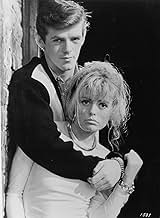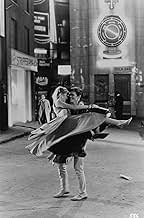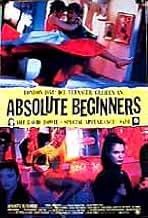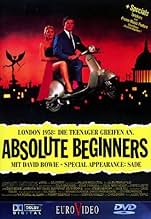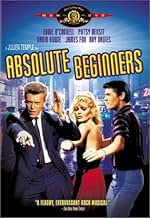IMDb रेटिंग
5.6/10
3.8 हज़ार
आपकी रेटिंग
लंदन में 1958 में, एक युवा फोटोग्राफर एक सुंदर, आकांक्षी फैशन डिजाइनर के प्यार को बनाए रखने के लिए मीडिया स्टारडम की तलाश करता है.लंदन में 1958 में, एक युवा फोटोग्राफर एक सुंदर, आकांक्षी फैशन डिजाइनर के प्यार को बनाए रखने के लिए मीडिया स्टारडम की तलाश करता है.लंदन में 1958 में, एक युवा फोटोग्राफर एक सुंदर, आकांक्षी फैशन डिजाइनर के प्यार को बनाए रखने के लिए मीडिया स्टारडम की तलाश करता है.
Joseph McKenna
- Fabulous Hoplite
- (as Joe McKenna)
Edward Tudor-Pole
- Ed the Ted
- (as Tenpole Tudor)
कहानी
क्या आपको पता है
- ट्रिवियाThe character of "Harry Charms" was based on a real-life British manager and impresario of the period, Larry Parnes, who was famous for hiring unknown singers and giving them extravagant stage names (his most famous client was Billy Fury). In 1960 he hired an unknown Liverpool band called The Beatles to accompany one of his lesser stars, Johnny Gentle, on a tour of Scotland, but he decided not to take the Beatles on as clients because he was only interested in handling solo singers, not groups.
- गूफ़During the riot scenes, in one shot a double decker bus is on fire. In the next shot, it isn't burning. In the next shot, it is. (During the T.V. announcers speak to the viewing public about the 'race riots').
- कनेक्शनEdited into Ray Davies: Quiet Life (1986)
- साउंडट्रैकSanta Lucia
Performed and composed by Ekow Abban
फीचर्ड रिव्यू
It is often said that the British just can't do film musicals. That even though we're pretty good at theatrical musicals, the cinematic version is, like gridiron football and republicanism, something best left to our cousins across the Atlantic. This prejudice even survived the award of a "Best Picture" Oscar to "Oliver!", and by the mid-eighties the traditional style of film musical was at a pretty low ebb even in America and virtually extinct in Britain. "Absolute Beginners" was therefore something completely unexpected. It was a British musical which owed nothing to Broadway and very little to the sort of pop-and-rock musicals ("Saturday Night Fever", "Fame", "Flashdance", etc.) which Hollywood had started to turn out in the seventies.
The film was also adapted from an unexpected source; the Colin MacInnes book of the same name about youth culture in late 1950s London. I doubt if MacInnes, who died in 1976, ever imagined that his novel would ever be turned into a musical. The story is set in the long hot summer of 1958. (At least, that's how MacInnes describes it, although Met Office records show that the summer of that year was wet and cool). The main character is Colin, a young photographer. In the original novel he was unnamed, but here he is named after his creator, rather oddly given that the book was not intended to be autobiographical. (MacInnes would have been 44 in 1958, a generation older than his character).
Colin falls in love with Crepe Suzette, an aspiring fashion designer, but she gets engaged to her boss Henley of Mayfair, motivated by career advantage rather than love, as Henley is an arrogant and unpleasant individual, old enough to be Suzette's father. In the book, in fact, the compulsively promiscuous Suzette is also not very pleasant, but here her character is very much softened. The film also deals with the Notting Hill race riots, shown here as having been whipped up by a Fascist rabble-rouser, unnamed but clearly based upon Oswald Mosley. The said demagogue is in league with a corrupt property developer who wants to drive the black inhabitants out of Notting Hill, at the time a very run-down area, in order to further one of his redevelopment schemes.
"Absolute Beginners" was panned by the critics and failed at the box-office. Together with the commercial failures of two other films released about the same time, "Revolution" and "The Mission", it led to a decline in the fortunes of Goldcrest, the major British film studio of the eighties. Some even started talking of a crisis in the British film industry, which had produced so many great films in the first half of the decade. The film was also disliked by literary purists who complained that it was not faithful to the original novel, particularly in the rewriting of MacInnes' ending and the bowdlerisation of Crepe Suzette's character.
And yet I loved the film and still do, even though the critics were partly right. Yes, the film has its flaws. Eddie O'Connell makes an uncharismatic hero, and seems too old for the part of Colin, who is supposed to be a teenager. (O'Connell has faded from view since 1986 to such an extent that I have been unable to find his exact date of birth, but he appears to be about thirty). The storyline does not always flow smoothly, perhaps not surprisingly given that it was the first feature film of its director Julien Temple, thitherto better known as the maker of pop videos and a documentary about the Sex Pistols. As for the literary purists, they are certainly right about its lack of fidelity to its literary source, although in its defence I should say that had it not been for this film I should in all probability never have discovered MacInnes' brilliant novel or his other writings.
The acting, like much in the film, is deliberately stylised. (Those who call it wooden are missing the point). The lovely Patsy Kensit makes a delightful heroine as Suzette in what has been described as her breakthrough role. At the time she was hailed as the "British Bardot" and is still a familiar face, even if she has never achieved her much-quoted ambition "to be more famous than anything or anyone".
Despite its faults, "Absolute Beginners" is a cool and stylish movie. It probably has little to do with the fifties as they actually were, but a lot to do with the fifties as they should have been. It has an immense drive and energy with an absolutely irresistible soundtrack. Modern audiences might be surprised that this is largely jazz based, given that we now tend to look back at the late fifties as the birth of the rock-and-roll era. At that time in Britain, however, before the rise of the Beatles, jazz was still very much part of the youth scene, particularly of the "mod" subculture, rock being associated with the mods' rivals, the "rockers". A number of leading musicians, such as David Bowie, Sade and the Style Council contributed to the film. (Bowie also makes an acting contribution as the property developer Vendice Partners).
I have a personal reason why this film is a favourite. It brings back memories a long hot summer- not that of 1958, when I was not even born, but that of 1986. At the time, I was young and in love and went to see the film with my girlfriend. I remember us coming out of the cinema together on a warm summer's evening, exhilarated by what we had just seen, and walking along the London Embankment, laughing and singing Bowie's great theme song to one another. "As long as we're together, all the rest can go to hell- I absolutely love you". With a memory like that, how could I do other than love this film? 8/10
The film was also adapted from an unexpected source; the Colin MacInnes book of the same name about youth culture in late 1950s London. I doubt if MacInnes, who died in 1976, ever imagined that his novel would ever be turned into a musical. The story is set in the long hot summer of 1958. (At least, that's how MacInnes describes it, although Met Office records show that the summer of that year was wet and cool). The main character is Colin, a young photographer. In the original novel he was unnamed, but here he is named after his creator, rather oddly given that the book was not intended to be autobiographical. (MacInnes would have been 44 in 1958, a generation older than his character).
Colin falls in love with Crepe Suzette, an aspiring fashion designer, but she gets engaged to her boss Henley of Mayfair, motivated by career advantage rather than love, as Henley is an arrogant and unpleasant individual, old enough to be Suzette's father. In the book, in fact, the compulsively promiscuous Suzette is also not very pleasant, but here her character is very much softened. The film also deals with the Notting Hill race riots, shown here as having been whipped up by a Fascist rabble-rouser, unnamed but clearly based upon Oswald Mosley. The said demagogue is in league with a corrupt property developer who wants to drive the black inhabitants out of Notting Hill, at the time a very run-down area, in order to further one of his redevelopment schemes.
"Absolute Beginners" was panned by the critics and failed at the box-office. Together with the commercial failures of two other films released about the same time, "Revolution" and "The Mission", it led to a decline in the fortunes of Goldcrest, the major British film studio of the eighties. Some even started talking of a crisis in the British film industry, which had produced so many great films in the first half of the decade. The film was also disliked by literary purists who complained that it was not faithful to the original novel, particularly in the rewriting of MacInnes' ending and the bowdlerisation of Crepe Suzette's character.
And yet I loved the film and still do, even though the critics were partly right. Yes, the film has its flaws. Eddie O'Connell makes an uncharismatic hero, and seems too old for the part of Colin, who is supposed to be a teenager. (O'Connell has faded from view since 1986 to such an extent that I have been unable to find his exact date of birth, but he appears to be about thirty). The storyline does not always flow smoothly, perhaps not surprisingly given that it was the first feature film of its director Julien Temple, thitherto better known as the maker of pop videos and a documentary about the Sex Pistols. As for the literary purists, they are certainly right about its lack of fidelity to its literary source, although in its defence I should say that had it not been for this film I should in all probability never have discovered MacInnes' brilliant novel or his other writings.
The acting, like much in the film, is deliberately stylised. (Those who call it wooden are missing the point). The lovely Patsy Kensit makes a delightful heroine as Suzette in what has been described as her breakthrough role. At the time she was hailed as the "British Bardot" and is still a familiar face, even if she has never achieved her much-quoted ambition "to be more famous than anything or anyone".
Despite its faults, "Absolute Beginners" is a cool and stylish movie. It probably has little to do with the fifties as they actually were, but a lot to do with the fifties as they should have been. It has an immense drive and energy with an absolutely irresistible soundtrack. Modern audiences might be surprised that this is largely jazz based, given that we now tend to look back at the late fifties as the birth of the rock-and-roll era. At that time in Britain, however, before the rise of the Beatles, jazz was still very much part of the youth scene, particularly of the "mod" subculture, rock being associated with the mods' rivals, the "rockers". A number of leading musicians, such as David Bowie, Sade and the Style Council contributed to the film. (Bowie also makes an acting contribution as the property developer Vendice Partners).
I have a personal reason why this film is a favourite. It brings back memories a long hot summer- not that of 1958, when I was not even born, but that of 1986. At the time, I was young and in love and went to see the film with my girlfriend. I remember us coming out of the cinema together on a warm summer's evening, exhilarated by what we had just seen, and walking along the London Embankment, laughing and singing Bowie's great theme song to one another. "As long as we're together, all the rest can go to hell- I absolutely love you". With a memory like that, how could I do other than love this film? 8/10
- JamesHitchcock
- 20 जन॰ 2010
- परमालिंक
टॉप पसंद
रेटिंग देने के लिए साइन-इन करें और वैयक्तिकृत सुझावों के लिए वॉचलिस्ट करें
- How long is Absolute Beginners?Alexa द्वारा संचालित
विवरण
- रिलीज़ की तारीख़
- कंट्री ऑफ़ ओरिजिन
- भाषा
- इस रूप में भी जाना जाता है
- Absolute Beginners - The Musical
- फ़िल्माने की जगहें
- उत्पादन कंपनियां
- IMDbPro पर और कंपनी क्रेडिट देखें
बॉक्स ऑफ़िस
- US और कनाडा में सकल
- $9,30,211
- US और कनाडा में पहले सप्ताह में कुल कमाई
- $83,743
- 20 अप्रैल 1986
- दुनिया भर में सकल
- $9,30,211
- चलने की अवधि1 घंटा 48 मिनट
- रंग
- पक्ष अनुपात
- 2.35 : 1
इस पेज में योगदान दें
किसी बदलाव का सुझाव दें या अनुपलब्ध कॉन्टेंट जोड़ें



